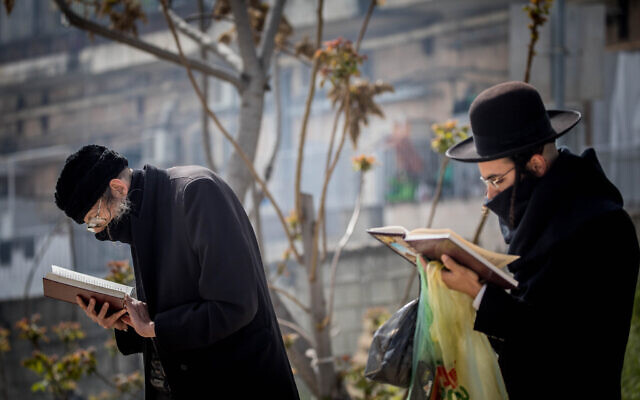by Haviv Rettig Gur
Hat tip: Dr. Jean-charles Bensoussan
Haredi culture is resilient, cohesive and more self-critical than most outsiders realize, but its strengths became its vulnerabilities in the face of COVID-19
Haredi society has been struck uniquely hard by the coronavirus
pandemic. Estimates at some Israeli hospitals say over half the
coronavirus patients are Haredi, even though the group makes up scarcely
a tenth of Israel’s population.
While clear figures for the virus’s spread are hard to come by, there’s no doubt of the pandemic’s enormous psychological toll on the community. Beloved rabbis have already succumbed, and stories of children mourning their parents at funerals in Brooklyn were shared far and wide on Haredi websites and WhatsApp groups over the past three weeks. It’s hard not to sympathize with the community as it faces quarantine, isolation and the looming specter of widespread illness.
But it is also hard not to sympathize with that society’s critics over the past few weeks.
Israelis were told to begin significant social distancing in early March. It took two critical weeks for Haredi rabbis to acknowledge the validity of the government order, two weeks during which major Haredi leaders insisted that communal prayer and learning was a better response. It took a long time, too, for Haredi leaders to acknowledge that this behavior, and the virus’s fast spread through their communities in Israel, New York and elsewhere as a result, has had direct and painful consequences for everyone else.

The anger Haredim have faced from the rest of Israeli society is
palpable, and, unpleasant as it may sound, understandable. It is not
bigotry to suggest that Haredi leaders’ initial disregard for the orders
of medical authorities, and their community’s seemingly blind adherence
to those leaders, have undermined the painful efforts of everyone else
to stem the spread of the virus.
Haredi insularity, Haredi disregard for health authorities during a pandemic, Haredi poverty and population density — all the factors that render them especially vulnerable to the virus, and through them everyone else — are ultimately a choice. There are no external or environmental factors forcing Haredim into their isolation and poverty, only their own cultural and religious commitments. They are therefore not only victims of their current circumstances, but also perpetrators, in the full light of day and of scientific warning.
And yet neither sympathy nor anger are sufficient. Before judging, we need an explanation. Something deeply perplexing just happened to Haredi society.

As Aharon Rose, a Jerusalem-based researcher of Haredi society who
grew up in the Belz Hasidic community, put it, “they screwed up so badly
that it requires a theory.”
Why were Haredim caught so flat-footed by the virus? Haredi society is not anti-scientific (whatever its detractors may say), especially when it comes to the medical sciences. Haredi rescue services, medical charities, physicians and even entire hospitals abound throughout the country. They know about viruses and they have as much trust and faith in the medical professions as other Israelis.
And why did so many different kinds of Haredim seem to share in the failure to adhere to social distancing guidelines? Haredi society is large and diverse. From Hasidic rebbes and their retinues to large and studious “Lithuanian” yeshivas to small Sephardi street-corner synagogues, from high-tech workers to yeshiva dropouts to devout heder teachers — across a huge diversity of lifestyles, social strata and religious and intellectual commitments, the failure appears to have been nearly universal.
“The [media] coverage falls on [Rabbi Chaim] Kanievsky,” who ordered educational institutions to remain open at the start of the crisis, noted Rose. “But the Hasidim, Satmar and so on, don’t really listen to Kanievsky, and they failed too. And Haredim all over the world failed.”

Religion is not really about dogmatic myths, magic, priestly privilege or other favorite targets of activist atheists. It survives because it is an especially adept vocabulary for producing narratives of meaning and socialization, for building communities and sharing social expectations and understandings across those communities.
By that measure, Haredi religious culture delivers in spades. In the Haredi community, a spiritual and meaningful life does not lie within the bounds of the individual but is granted by communal ties, by shared ritual and ceremony and loyalty. Those ties are constantly buttressed against centrifugal and invasive forces, for example by a distinctive dress that raises the cost of stepping outside the ingroup, thus affirming and demonstrating one’s loyalty and commitment to the ingroup and its principles.

This is not a principle of Haredi life, it’s the
principle. To outsiders the term “Haredi” is usually a religious
category, but one is hard-pressed to find a specific and agreed-upon
theological idea that unites and distinguishes the Haredim. What they
share, what defines their society as a distinct subgroup in a broader
Israeli and Jewish culture, is a sociological idea. Boundaries upon
boundaries, achieving socialization and loyalty — and from them lives of
belonging and meaning — by the construction of a tight-knit group and
clear separation from the outside.
The virus was like nothing that came before, more treacherous and shocking precisely because its path into the Haredi community traveled over the very cords and sinews binding Haredi life together. All that was good and happy about Haredi society, the socialization and close-knit communal life, the shared prayer and sacralization of study — all these served as the virus’s route of attack.
“The Haredi character is problematic in a plague,” according to Prof. Benny Brown, a scholar of Orthodox Jewish ideology, law and history at Hebrew University’s Department of Jewish Thought. “Haredism is very communal. It’s hard to abandon the minyan [prayer quorum] and tish [Hasidic gathering at the rebbe’s table], but that’s even true at the level of daily contact in the street. They cultivate large families: three rooms with 11 souls is a very hard situation in which to isolate or protect yourself from a plague.”

Discussion of Haredi society among outsiders tends to focus on
criticism leveled at it from within and without, but one cannot ignore
the many studies (for example, see “life satisfaction” findings on p. 71
here) that have found that intensive Haredi communalism is a source of real and sustained happiness.
“It’s a lifestyle with benefits and costs. The benefits are precious. It almost always works. It only stops working in extremely anomalous circumstances,” said Brown. “So it’s not fair to say [to Haredi society] that your lifestyle is the cause of evil when the vast majority of the time it’s a source for happiness.”
At least at first.

Once the mental switch was made, however belatedly, Israeli Haredi
society had no trouble obeying the new social distancing rules. Jewish
law sanctifies saving lives above all ritual requirements, so the
religious rationale for suspending communal life was already present. By
the end of March, small handfuls of “extremists” — essentially
conspiracy theorists who see threats to Haredi boundary-making
everywhere and always — still resisted, but the million-strong Israeli
Haredi culture as a whole, and the entire edifice of rabbinic authority,
powerful media organizations and Haredi medical and social service
organizations, all lined up in support of social distancing.
In a sense, very little has happened. True, Haredi spiritual leadership was revealed as detached and inadequate to the demands of worldly events, but only an outsider would believe Haredim don’t already know that about their leaders.
“When I was a kid in Bnei Brak there was a famous joke,” Rose said. “There were two ‘Chaims,’ two nephews and students of the Hazon Ish [the famed Haredi spiritual leader Rabbi Avrohom Yeshaya Karelitz], who didn’t have his own children. One ‘Chaim’ [you went to] for a blessing, the other for success — and Heaven protect you if you confuse the two.”
The latter Chaim was Rabbi Chaim Greineman, who passed away in 2015 at the age of 91. He was known for “having his feet on the ground, for his knowledge of medicine” — he penned many religious legal rulings on medical matters — “for his business [acumen], for his connections to politicians,” Rose noted. He was the Chaim of worldly success.

The other Chaim, the holy man who dispensed blessings, was Rabbi
Chaim Kanievsky, now 92, the man who couldn’t bring himself to shutter
the schools and seminaries and synagogues of Haredi society at the
beginning of March. He is “known for being detached. He learns 18 hours a
day, writes masterpieces, but is disconnected from reality.”
The two “Chaims” are a shorthand for a duality fundamental to Haredi life — both a detachment from materialism and modernity and a deep reliance on them. And the joke’s warning about confusing the two realms is no laughing matter in the Haredi view. One should go to the holy man for spiritual sustenance and blessing, but to seek worldly success at his feet is a fast track to failure.
Haredim “are disconnected on one hand, but their feet are always firmly planted on the ground,” said Brown. “Their very poverty means they have to worry about real life and work and the economy.”
They can forgive their rabbis a great many failures if those failures are rooted in that gap between quotidian life and detached holiness.

Kanievsky, who would later reverse his position and explain that he
hadn’t yet heard about the pandemic when he refused to close the
schools, “showed his weakness” as a leader, said Brown. “But that
weakness also reflects his holiness and grandeur, his total investment
in the Torah.”
In the end, Haredi culture is likely to prove skeptical enough, Haredi discourse diverse enough, and Haredi humor self-effacing enough to weather the storm. The challenge represented in the failure of Haredi leadership to pivot quickly from intensive communalism to social distancing is not, in itself, insurmountable.
As the virus takes its toll, that failure “will create some confusion and cracks in the short term, yes,” said Brown. “But in the long term, the Haredi world has all the intellectual and religious tools to deal with the challenge and to overcome it,” including and especially its unique brand of freethinking obeisance toward its leaders.
Haredi culture is not the cartoon its critics imagine. Its failure in the face of the coronavirus crisis has nonetheless been profound. But it is also a culture primed for change. The virus’s real effect may come piecemeal, over time and as part of a broader shift in Haredi culture. It is no earthquake, but could it be a tipping point?
“There are too many variables we don’t know,” Brown said. “We may discover that many more Haredim [than we believe] are quietly skeptical. The poverty that may come after the virus may send more people to work. It may be a crack that lets all the other changes — internet penetration, growing skepticism, poverty — turn into a dramatic shift.”
While clear figures for the virus’s spread are hard to come by, there’s no doubt of the pandemic’s enormous psychological toll on the community. Beloved rabbis have already succumbed, and stories of children mourning their parents at funerals in Brooklyn were shared far and wide on Haredi websites and WhatsApp groups over the past three weeks. It’s hard not to sympathize with the community as it faces quarantine, isolation and the looming specter of widespread illness.
But it is also hard not to sympathize with that society’s critics over the past few weeks.
Israelis were told to begin significant social distancing in early March. It took two critical weeks for Haredi rabbis to acknowledge the validity of the government order, two weeks during which major Haredi leaders insisted that communal prayer and learning was a better response. It took a long time, too, for Haredi leaders to acknowledge that this behavior, and the virus’s fast spread through their communities in Israel, New York and elsewhere as a result, has had direct and painful consequences for everyone else.

Police officers close synagogues and hand
out fines to Haredi Jews in Jerusalem’s Bukharim neighborhood,
following government restrictions imposed as part of the effort to
contain the spread of the coronavirus, April 6, 2020. (Yonatan
Sindel/Flash90)
Haredi insularity, Haredi disregard for health authorities during a pandemic, Haredi poverty and population density — all the factors that render them especially vulnerable to the virus, and through them everyone else — are ultimately a choice. There are no external or environmental factors forcing Haredim into their isolation and poverty, only their own cultural and religious commitments. They are therefore not only victims of their current circumstances, but also perpetrators, in the full light of day and of scientific warning.
Haredi society is not anti-scientific (whatever its detractors may say), especially when it comes to the medical sciences. Haredi rescue services, medical charities, physicians and even entire hospitals abound throughout the country. They know about viruses and they have as much trust and faith in the medical professions as other IsraelisIt is important to be blunt about such things. The anger at the Haredim has sometimes veered into bigotry, but most of it remains in the realm of specific and substantive criticism for which Haredi society, for all its cries of “anti-Semitism,” has no satisfying answer.
And yet neither sympathy nor anger are sufficient. Before judging, we need an explanation. Something deeply perplexing just happened to Haredi society.

A small group of family and friends mourn
at the funeral of Rabbi Ben-Zion Cooperstock, who died of complications
of a coronavirus infection, at the Shamgar Funeral Home in Jerusalem on
April 5, 2020.
(Yonatan Sindel/Flash90)
Why were Haredim caught so flat-footed by the virus? Haredi society is not anti-scientific (whatever its detractors may say), especially when it comes to the medical sciences. Haredi rescue services, medical charities, physicians and even entire hospitals abound throughout the country. They know about viruses and they have as much trust and faith in the medical professions as other Israelis.
And why did so many different kinds of Haredim seem to share in the failure to adhere to social distancing guidelines? Haredi society is large and diverse. From Hasidic rebbes and their retinues to large and studious “Lithuanian” yeshivas to small Sephardi street-corner synagogues, from high-tech workers to yeshiva dropouts to devout heder teachers — across a huge diversity of lifestyles, social strata and religious and intellectual commitments, the failure appears to have been nearly universal.
“The [media] coverage falls on [Rabbi Chaim] Kanievsky,” who ordered educational institutions to remain open at the start of the crisis, noted Rose. “But the Hasidim, Satmar and so on, don’t really listen to Kanievsky, and they failed too. And Haredim all over the world failed.”

IDF Home Front Command soldiers
distribute food packages to elderly residents obliged to stay home due
the coronavirus pandemic ahead of the Jewish holiday of Passover, in a
Haredi neighborhood in Jerusalem, April 7, 2020. (Olivier
Fitoussi/Flash90)
‘It almost always works’
The crisis has sparked a deluge of speculation about the future of Haredi society. Would the rabbis’ manifest and almost wall-to-wall failure to grasp the new situation lead to new skepticism and individualism in the community? Would some question their faith? Would it drive more Haredim to secular education and the job market?Religion survives because it is an especially adept vocabulary for producing narratives of meaning and socialization, for building communities and sharing social expectations and understandings across those communities. By that measure, Haredi religious culture delivers in spadesMuch of this is wishful thinking on the part of critics who believe their case against the Haredi worldview has just been validated by impartial natural forces. But if that was how religion worked, then as Sigmund Freud once erroneously predicted, there would now scarcely be a religion left on Earth.
Religion is not really about dogmatic myths, magic, priestly privilege or other favorite targets of activist atheists. It survives because it is an especially adept vocabulary for producing narratives of meaning and socialization, for building communities and sharing social expectations and understandings across those communities.
By that measure, Haredi religious culture delivers in spades. In the Haredi community, a spiritual and meaningful life does not lie within the bounds of the individual but is granted by communal ties, by shared ritual and ceremony and loyalty. Those ties are constantly buttressed against centrifugal and invasive forces, for example by a distinctive dress that raises the cost of stepping outside the ingroup, thus affirming and demonstrating one’s loyalty and commitment to the ingroup and its principles.

Police officers close synagogues and hand
out fines to Haredi Jews in the Mea Shearim neighborhood of Jerusalem,
following government restrictions imposed as part of the effort to
contain the spread of the coronavirus, April 6, 2020. (Yonatan
Sindel/Flash90)
The virus was like nothing that came before, more treacherous and shocking precisely because its path into the Haredi community traveled over the very cords and sinews binding Haredi life togetherThe coronavirus crisis was not a crisis of leadership or dogmatism. It did not “disprove” Haredi religious belief. The initial response of Haredi leaders wasn’t a rejection of science, but something less coherent — a stunned refusal, an instinctive rejection of the enormity of what was being asked of it. It was a crisis of sociology.
The virus was like nothing that came before, more treacherous and shocking precisely because its path into the Haredi community traveled over the very cords and sinews binding Haredi life together. All that was good and happy about Haredi society, the socialization and close-knit communal life, the shared prayer and sacralization of study — all these served as the virus’s route of attack.
“The Haredi character is problematic in a plague,” according to Prof. Benny Brown, a scholar of Orthodox Jewish ideology, law and history at Hebrew University’s Department of Jewish Thought. “Haredism is very communal. It’s hard to abandon the minyan [prayer quorum] and tish [Hasidic gathering at the rebbe’s table], but that’s even true at the level of daily contact in the street. They cultivate large families: three rooms with 11 souls is a very hard situation in which to isolate or protect yourself from a plague.”

Haredi Jews burn leavened items in a
final ritual preparation before the Passover holiday in the Mea Shearim
neighborhood in Jerusalem, April 8, 2020. (Yonatan Sindel/Flash90)
“It’s a lifestyle with benefits and costs. The benefits are precious. It almost always works. It only stops working in extremely anomalous circumstances,” said Brown. “So it’s not fair to say [to Haredi society] that your lifestyle is the cause of evil when the vast majority of the time it’s a source for happiness.”
What happens now?
All last month, Haredi society faced a challenge more basic than a crisis of faith, a discrediting of its leadership, or even simply a medical crisis. It was what Rose called “an intense intrusion of a foreign reality” to which its most fundamental social institutions had no response.At least at first.

Haredi men wearing face masks walk past
Health Ministry posters warning against large Passover holiday
gatherings amid the coronavirus pandemic, in Jerusalem on April 5, 2020.
(Olivier Fitoussi/Flash90)
In a sense, very little has happened. True, Haredi spiritual leadership was revealed as detached and inadequate to the demands of worldly events, but only an outsider would believe Haredim don’t already know that about their leaders.
“When I was a kid in Bnei Brak there was a famous joke,” Rose said. “There were two ‘Chaims,’ two nephews and students of the Hazon Ish [the famed Haredi spiritual leader Rabbi Avrohom Yeshaya Karelitz], who didn’t have his own children. One ‘Chaim’ [you went to] for a blessing, the other for success — and Heaven protect you if you confuse the two.”
The latter Chaim was Rabbi Chaim Greineman, who passed away in 2015 at the age of 91. He was known for “having his feet on the ground, for his knowledge of medicine” — he penned many religious legal rulings on medical matters — “for his business [acumen], for his connections to politicians,” Rose noted. He was the Chaim of worldly success.

Rabbi Chaim Kanievsky at his home in Bnei Brak on April 15, 2018. (Yaakov Naumi/Flash90)
The two “Chaims” are a shorthand for a duality fundamental to Haredi life — both a detachment from materialism and modernity and a deep reliance on them. And the joke’s warning about confusing the two realms is no laughing matter in the Haredi view. One should go to the holy man for spiritual sustenance and blessing, but to seek worldly success at his feet is a fast track to failure.
Haredim “are disconnected on one hand, but their feet are always firmly planted on the ground,” said Brown. “Their very poverty means they have to worry about real life and work and the economy.”
They can forgive their rabbis a great many failures if those failures are rooted in that gap between quotidian life and detached holiness.

Rabbi Chaim Greineman (Wikipedia/CC BY-SA/פיראוס)
In the end, Haredi culture is likely to prove skeptical enough, Haredi discourse diverse enough, and Haredi humor self-effacing enough to weather the storm. The challenge represented in the failure of Haredi leadership to pivot quickly from intensive communalism to social distancing is not, in itself, insurmountable.
As the virus takes its toll, that failure “will create some confusion and cracks in the short term, yes,” said Brown. “But in the long term, the Haredi world has all the intellectual and religious tools to deal with the challenge and to overcome it,” including and especially its unique brand of freethinking obeisance toward its leaders.
Haredi culture is not the cartoon its critics imagine. Its failure in the face of the coronavirus crisis has nonetheless been profound. But it is also a culture primed for change. The virus’s real effect may come piecemeal, over time and as part of a broader shift in Haredi culture. It is no earthquake, but could it be a tipping point?
“There are too many variables we don’t know,” Brown said. “We may discover that many more Haredim [than we believe] are quietly skeptical. The poverty that may come after the virus may send more people to work. It may be a crack that lets all the other changes — internet penetration, growing skepticism, poverty — turn into a dramatic shift.”
Haviv Rettig Gur
Source: https://www.timesofisrael.com/more-basic-than-a-crisis-of-faith-will-the-virus-upend-ultra-orthodox-society/
Follow Middle East and Terrorism on Twitter
No comments:
Post a Comment